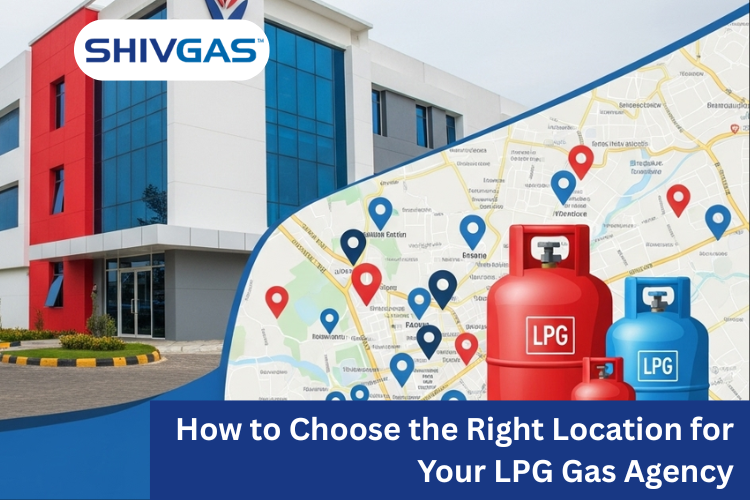
Starting a LPG distribution business is not simply about capital investment, regulatory approvals, and reliable supply chains. It is equally about considering the most underestimated factor prior to operating, that is, the choice of location.
If you’re planning to serve urban households, rural communities, or commercial clients, proper positioning of your gas agency exercises a significant influence on customer access, operational logistics, safety, and profitability.
This blog serves as a practical handbook for aspiring gas dealers and entrepreneurs, helping them to understand what makes a location suitable for setting up a gas agency
A LPG dealership is a licensed dealer selling and distributing cooking gas cylinders to household or business customers. These agencies act as intermediaries between final consumers and bottling plants. They generally carry out business on an independent or franchise-based business model.
As the demand for cleaner fuels increases in India, the private LPG industry is developing at a fast pace beyond traditional urban centers into tier-2 and rural markets. Similarly, the location of your agency can have a direct impact on your customer reach, transport costs, safety compliance, and the convenience of operations.
Before confirming the location for setting up your gas agency, it’s important to know about the rules and regulations that need to be adhered to in the locality. Some areas having high-density residential zones or protected areas may have restrictions on LPG-related activities. Areas that have densely populated residential zones may have restrictions on LPG-related activities. Therefore, check that your selected plot is categorized appropriately under industrial, semi-industrial, or commercial use.
As per the government safety regulations, establishing a private gas agency should have a buffer zone between the LPG storage godown and nearby buildings or roads. The Petroleum and Explosives Safety Organisation (PESO) lays down certain safety guidelines for minimum safety distances, fencing, and ventilation that should be adopted and adhered to.
Are you targeting domestic consumers or commercial clients? To reach out domestic users, you’ll have to be situated closer to densely populated housing clusters. In the same way, to meet the exceeding demands of commercial businesses like hotels, caterers, or factories, operating around an industrial area is likely to be more viable.
Keep track of existing LPG dealers who are located within a 5–10 km radius of your agency. While the market is highly competitive, setting up too close to an established agency can affect your initial growth. On the other hand, entering an underserved or newly developing area will lead to a strong market-captivating opportunity.
Efficient LPG delivery relies on fast, safe transportation. Choose a location with good road connectivity, minimal traffic congestion, and easy access to nearby highways or main roads. Uneven roads lead to delivery delays, higher fuel costs, and frustrated customers.
Your business must have reliable access to power, clean water, waste disposal, and internet service. These facilities aren’t luxuries, rather they’re the basic necessities for day-to-day activities.
The space required to run the day-to-day LPG operations will depend on the quantity of goods expected to be sold. A small agency is capable of accommodating limited inventory and is suitable for the initial stages. But facilities for extra storage, parking, and loading areas should also be made available if plans are made to scale the operation in the future.
The location you choose for running your agency should have provisions for the installation of safety equipment like fire-fighting setups, ventilated storage units, perimeter fencing, and emergency exits. Avoid operating on congested sites where such features may be compromised due to space constraints.
Depending on your budget and business model, you may consider purchasing land or leasing it. Ownership gives long-term security and expansion freedom, while leasing may reduce initial capital expenditure. However, always ensure lease terms allow uninterrupted operation for a reasonable period.
Beyond the obvious costs of land and construction, factor in recurring expenses—delivery vehicle access, maintenance, utility bills, security, and insurance. Sometimes, a seemingly affordable site turns expensive due to inefficient operations or high compliance costs.
Urban peripheries maintain a strategic balance of affordability and accessibility. In these off-beat locations, the cost of land is comparatively less, and there are little to no regulatory constraints. This offers a prominent growth potential for private LPG agencies, making them a strong choice for long-term LPG business operations.
Rural and semi-urban regions are currently witnessing a steady rise in LPG demand. This positive shift is driven by improved infrastructure facilities and increasing adoption of clean energy. So, with limited competition and favorable government initiatives, the private LPG sector offers a promising yet rewarding ground for sustainable business development.
If your target clients are hotels, factories, or hospitals, then being located near an industrial estate makes logistical and business sense. This reduces delivery distance and can help you to serve bulk orders in less time. This establishes long-term client relationships.
Choosing the right location for your gas agency goes beyond availability or convenience. It’s a strategic decision that impacts everything from customer experience to safety compliance, market growth, and operational costs.
So, if you’re planning to enter the private LPG distribution space, take time to map your location strategy carefully because in this business, your address is more than a pin on the map. It’s your gateway to growth.
Ans. Absolutely, yes. Where you set up determines everything from how easily customers can reach you to how efficiently deliveries are made. Even the best-run agency can struggle if it’s placed in the wrong spot. Location can make or break your operations.
Ans. You definitely can. Many successful dealers begin with modest infrastructure and scale gradually. What matters is choosing a location that allows for future growth—space, accessibility, and compliance. All of this comes into play as your business expands.
Ans. Typically, urban outskirts, industrial zones, or growing rural areas are ideal. The best location depends on your customer base and delivery radius.
Comment (0)